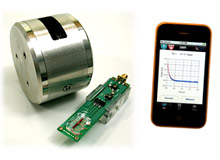Smartphone-based lab testing device could eliminate need to send biopsies to pathology laboratories
For years, pathologists have wondered when technology would make it feasible to diagnose cancer at the patient’s beside. Eliminating the need for a traditional biopsy that goes off to the anatomic pathology laboratory, and requires 24 hours or more to process the tissue and evaluate the case. Now scientists at Harvard Medical School may be close to perfecting a device that can allow oncologists to do exactly that type of bedside analysis and produce a diagnosis in 60 minutes or less!
The heart of this technology is a new microchip that interacts with smartphone software. Researchers believe it will be possible for physicians to diagnose cancer at the bedside in less than 60 minutes.
Engineered by scientists at Harvard Medical School and Massachusetts General Hospital, the portable nuclear magnetic resonance (micro-NMR) system analyzes small tissue samples. This system accurately identifies malignancies 96% of the time, which, according to the researchers, is more accurate than the existing cancer tests used by pathology laboratories and clinical laboratories.
In a study published in Science Translational Medicine, researchers took the wraps off their quantitative micro-NMR system. They claim that it “shows potential for cancer diagnosis in the clinic” and at the point of care.

The micro-NMR device (center) receives the magnet’s (left) field and detects cancer proteins that have bonded with binding molecules. It then sends the results to an attached smartphone (right). Photo sourced from Technology Review.
Micro-NMR Technology Removes Human Error in Pathology Testing
Hakho Lee , Ph.D., is one of the study’s authors. He is also an Assistant Professor at the Center for Systems Biology at Massachusetts General Hospital. In an article published in Technology Review, Lee suggested that removing the possibility for human error might explain the micro-NMR test’s extreme accuracy.
As described by Lee, the standard procedure now in use requires a physician to send a patient’s tissue biopsy to a lab. There the tissue is processed in the histology laboratory, then mounted on slides and analyzed by surgical pathologists. However, Lee noted that this workflow can introduce proteins not present in the original tissue sample. By contrast, the new micro-NMR test bypasses that entire anatomic laboratory process.
“In our design, we inject everything from the patient into the device, and then it will give out a result,” said Lee in the Technology Review article.
According to the final report by the study authors, “The mean clinical turnaround time for conventional pathology, from sample submission to final report, was three days for cytology (range, one to eight days) and four days for surgical pathology (range, one to 11 days). The measurement time for [micro-NMR] was typically less than 60 minutes.
“Conventional cytology on fine-needle aspirate specimens was performed in 49 of 50 cases, and provided an accurate diagnosis in 36 of 49 cases (accuracy, 74%). Conventional histology was done on all core biopsies and correctly diagnosed 45 cases (accuracy, 84%). The remaining results either were non-diagnostic (five cases), or provided a false-negative result (eight cases). Thus, [micro-NMR] performed consistently better (accuracy, 96%) than the current standard of care.”
Nanotechnology Key Element in Micro-NMR Laboratory Testing System
The micro-NMR system can simultaneously detect proteins from multiple types of cancers. To do this, researchers developed a microchip that holds magnetic nanoparticles in a solution. Binding molecules, or ligands, are then attached to the nanoparticles. When tissue samples from patients are injected into the microchip, the system generates a magnetic field through which the smartphone-based software identifies which proteins have attached to which ligands. This enables the device to then deliver a positive or negative result for specific cancer types.
Researches discovered, however, that the proteins degraded quickly after about an hour, leading them to conclude that for the test to be successful, the sample proteins would have to be fixed on the cell surface, or the test would have to be concluded within the one-hour window. The researchers opted for the latter. They designed the micro-NMR chip to install on a smartphone, enabling physicians to analyze the sample and render a diagnosis at the patient’s bedside in less than 60 minutes.
“People would like to do protein-based diagnostics via blood analysis,” said James Heath, Ph.D., Professor of Chemistry at California Institute of Technology in the same Technology Review article. “For either blood or tissue analysis, sample degradation over time is a common issue. [The micro-NMR] certainly overcomes the challenge … since the measurements are all done very quickly following biopsy.”
Micro-NMR’s first application will be used to diagnose tuberculosis. The research group’s next project involves using the system to detect ovarian cancer.
Of course, it will take some time before this micro-NMR technology makes it through regulatory approval and is ready for use in clinical settings. However, for pathologists and clinical laboratory managers, this is an example of how several disparate technologies can be brought together to create a sophisticated molecular diagnostic test that has the potential to be highly-disruptive to long-standing work practices in surgical pathology.
—Michael McBride
Related Information:




I need this device.From where can i purchase it?